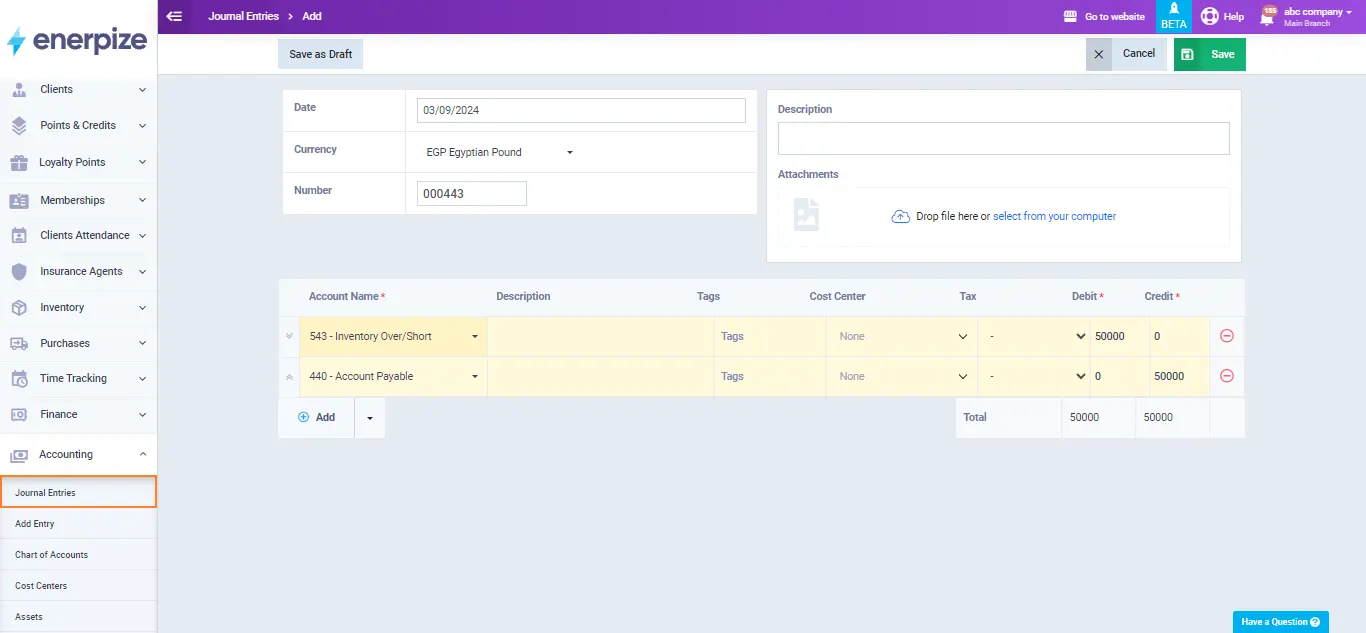Author : Haya Assem
Reviewed By : Enerpize Team
What Are Intercompany Transactions Journal Entries

Table of contents:
- What are Intercompany Transactions Journal Entries?
- Importance of Intercompany Journal Entries in Accounting
- Intercompany Transactions Journal Entries Examples
- How to Record Intercompany Journal Entries?
- How Can Intercompany Journal Entry Help Businesses?
- Streamlining Journal Entries for Intercompany Transactions with Enerpize
Intercompany transactions are crucial for organizations with multiple subsidiaries. These transactions, which include sales, loans, and expense allocations between entities, need to be accurately recorded through journal entries.
This ensures that each subsidiary's financial records are correct and that consolidated financial statements accurately reflect the group's overall financial position. Properly documenting these transactions facilitates clear and accurate financial reporting, supporting the organization’s ability to manage and assess its financial health effectively.
Key Takeaways
- Intercompany transactions are financial dealings between a parent company's subsidiaries. Accurately recording these with journal entries is vital for correct individual subsidiary records and accurate consolidated financial statements.
- Proper intercompany entries lead to accurate financial reporting, enhanced financial control, regulatory compliance, improved operational efficiency, and better strategic planning.
- Common examples include intercompany sales of goods or cash transfers, each requiring specific debit and credit entries for involved entities.
- Recording involves identifying transactions, preparing corresponding entries in both sets of books, ensuring consistency, regularly reconciling accounts, eliminating them during consolidation, and documenting for audit.
- These entries enhance transparency, ensure accounting standard compliance, strengthen internal controls, aid divisional profitability analysis, optimize cost allocation, and improve tax efficiency.
What are Intercompany Transactions Journal Entries?
Intercompany transactions are financial activities that take place between separate companies or subsidiaries of the same parent company. These transactions may include the sale of products or services, loans, expense allocations, and asset transfers. Since these organizations fall under the same corporate structure, their transactions must be properly recorded to ensure accurate financial reporting.
Journal entries for intercompany transactions are the specific accounting entries used to record these transactions in the accounting books of both involved subsidiaries. These entries are crucial for maintaining accurate records within each subsidiary and ensuring that the parent company’s consolidated financial statements reflect the true financial position. When preparing consolidated financial statements, these intercompany entries are often eliminated to avoid double counting and to present the group as a single economic entity.
Importance of Intercompany Journal Entries in Accounting
Managing a complex organizational structure with multiple subsidiaries and maintaining accurate and transparent financial records is essential. Proper handling of financial activities between these entities ensures that each subsidiary’s books are correctly maintained and also that the consolidated financial statements of the entire group are reliable and reflective of the actual financial position. Effective management of these internal transactions plays a significant role in the overall financial integrity and operational efficiency of the organization.
Accurate Financial Reporting
Intercompany transactions must be eliminated during consolidation to prevent double counting of revenues and expenses. An accurate intercompany journal entry ensures that consolidated financial statements reflect the true financial position of the group and maintain consistency in reporting across all entities.
Financial Control and Monitoring
Intercompany entries track transactions between subsidiaries, aiding in monitoring fund flow and resource allocation. Accurate recording helps organizations manage budgets and forecast financial performance at both the entity and group levels.
Regulatory Compliance
Accurate intercompany entries ensure adherence to tax regulations, including transfer pricing rules requiring arm's-length transactions. They also provide an audit trail for verifying financial statements and meeting regulatory standards.
Operational Efficiency
Proper intercompany accounting ensures efficient resource and cost allocation among subsidiaries, enhancing decision-making and operational efficiency. Regular updates and reconciliations of intercompany accounts help identify discrepancies and ensure accurate transaction recording.
Read Also: Journal Entries for Bank Reconciliation: A Comprehensive Guide
Strategic Planning
Intercompany entries enable accurate analysis of individual subsidiary performance and their contribution to overall profitability. Clear visibility into these transactions supports informed investment decisions and assessment of the organization's financial health.
Read Also: Reversing Entries Accounting: Purpose and Examples
Intercompany Transactions Journal Entries Examples
Here are examples of intercompany journal entries to illustrate how transactions between subsidiaries are recorded:
Example 1: Sale of Goods Between Subsidiaries
In this example, Subsidiary A sells goods worth $10,000 to Subsidiary B, with a cost of goods sold (COGS) of $6,000 for Subsidiary A. The transactions include revenue recognition, the cost of goods sold, and the inventory purchase for Subsidiary B.
Subsidiary A’s Entry: Revenue Recognition
Subsidiary A recognizes the revenue from the sale of goods to Subsidiary B. The company debits Accounts Receivable (reflecting the amount owed by Subsidiary B) and credits Sales Revenue (indicating the sale made).
| Date | Account | Debit | Credit |
| 09/03/2024 | Accounts Receivable | $10,000 | |
| Sales Revenue | $10,000 |
Subsidiary A’s Entry: Cost of Goods Sold (COGS)
Subsidiary A records the cost of the goods sold. The debit to Cost of Goods Sold reflects the expense incurred for producing or purchasing the goods sold, while the credit to Inventory reduces the value of inventory on hand, as the goods are transferred to Subsidiary B.
| Date | Account | Debit | Credit |
| 09/03/2024 | Cost of Goods Sold | $6,000 | |
| Inventory | $6,000 |
Subsidiary B’s Entry: Inventory Purchase
Subsidiary B records the purchase of goods from Subsidiary A. The debit to Inventory reflects the increase in assets (goods purchased), while the credit to Accounts Payable reflects the liability to Subsidiary A for the amount due.
| Date | Account | Debit | Credit |
| 09/03/2024 | Inventory | $10,000 | |
| Accounts Payable | $10,000 |
Example 2: Intercompany Cash Transfer
In this example, Subsidiary A transfers $15,000 in cash to Subsidiary B. Both subsidiaries need to record the transfer in their books.
Subsidiary A’s Entry: Cash Transfer
Subsidiary A records the transfer of funds to Subsidiary B. The debit to Intercompany Transfers shows that Subsidiary A is transferring the amount internally (it represents a receivable from Subsidiary B), and the credit to Cash reflects the decrease in Subsidiary A’s available cash.
| Date | Account | Debit | Credit |
| 01/01/2024 | Intercompany Transfers | $15,000 | |
| Cash | $15,000 |
Subsidiary B’s Entry: Cash Receipt
Subsidiary B records the receipt of the cash transfer from Subsidiary A. The debit to Cash increases Subsidiary B’s cash balance, and the credit to Intercompany Transfer reflects the liability to Subsidiary A for the cash received.
| Date | Account | Debit | Credit |
| 01/01/2024 | Cash | $15,000 | |
| Intercompany Transfers | $15,000 |
Read Also: Sales Journal Entry: A Detailed Guide
How to Record Intercompany Journal Entries?
Recording intercompany journal entries involves several key steps to ensure accuracy and consistency across all subsidiaries. These recording steps are:
1- Identify the Transaction
Determine the nature of the intercompany transaction, such as a sale of goods, provision of services, loan, or expense allocation.
2- Prepare the Journal Entries
To record intercompany journal entries, document the transaction in both subsidiaries' books, ensuring each entry reflects the nature of the transaction. This involves making corresponding debits and credits in the sending and receiving subsidiaries to accurately capture the financial impact of the transaction.
3- Ensure Consistency
Ensure that the amounts and accounts used are consistent between the two subsidiaries to maintain balanced entries. For instance, if one subsidiary records a debit to Accounts Receivable, the other should record a corresponding credit to Accounts Payable.
Read Also: How to Calculate Accounts Receivable Turnover
4- Reconcile Intercompany Accounts
Regularly reconcile intercompany accounts to ensure that all transactions are accurately recorded and that discrepancies are identified and resolved.
5- Eliminate Intercompany Transactions in Consolidation
During the consolidation process, eliminate intercompany transactions to avoid double counting and accurately reflect the financial position of the consolidated group. This involves removing the reciprocal entries recorded by both subsidiaries.
6- Review and Document
Review the journal entries for accuracy and completeness. Maintain detailed documentation for each transaction to support financial reporting and audits.
Read Also: How to Track Business Expenses?
How Can Intercompany Journal Entry Help Businesses?
Intercompany journal entries are essential for businesses with multiple subsidiaries or divisions as they ensure accurate consolidation of financial statements by recording transactions between entities. This practice enhances transparency and compliance with accounting standards like IFRS or GAAP, while also reinforcing internal controls to mitigate errors and fraud.
Additionally, they aid in analyzing the profitability of individual divisions, optimizing cost allocation, and improving tax efficiency by adhering to transfer pricing regulations. Moreover, clear documentation of these entries simplifies the audit process, making it more efficient and less time-consuming.
Overall, intercompany journal entries help to provide accurate financial reporting, better control, and strategic insights into the business's activities.
Read Also:
Adjusting Journal Entries: Definition, Types, and Examples
Payroll Journal Entries in Accounting: Definition, Types, & Examples
Prepaid Expense Journal Entries: Importance, Examples & How to Record?
Lease Accounting Journal Entries: Types, Standards & Calculating Steps

Streamlining Journal Entries for Intercompany Transactions with Enerpize
Enerpize simplifies the management of intercompany transactions by automating journal entries and consolidating financial data across subsidiaries. With Enerpize, you can easily record intercompany loans, sales, and shared expenses, ensuring accuracy and compliance with accounting standards.
Our online accounting software seamless integration feature facilitates real-time updates, reduces manual errors, and provides clear visibility into intercompany balances. This streamlined approach not only enhances efficiency but also supports effective financial reporting and strategic decision-making.

Intercompany transactions journal entries are easy with Enerpize.
Try our accounting module to handle your entries.








